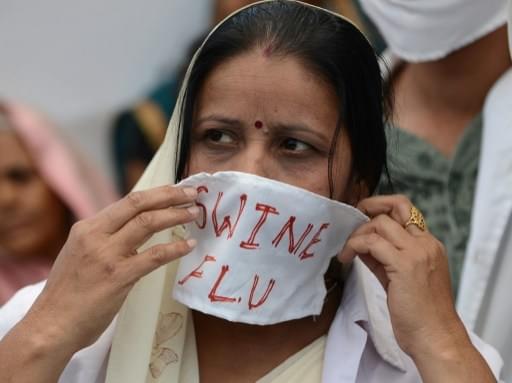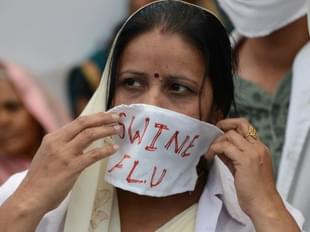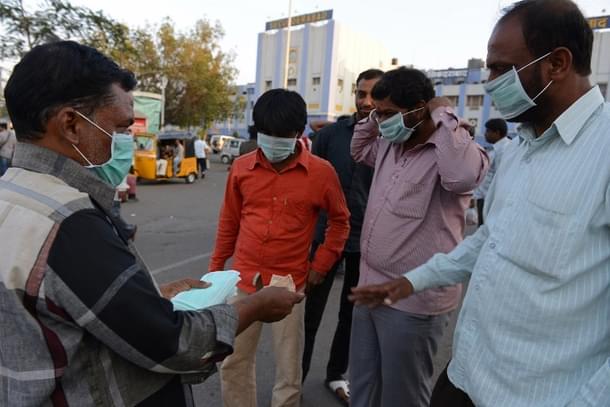Business
Deal With Swine-Flu The Singapore Way
Sagar Godbole
Mar 05, 2015, 06:22 PM | Updated Feb 11, 2016, 08:37 AM IST
Save & read from anywhere!
Bookmark stories for easy access on any device or the Swarajya app.


Universities and colleges an India can learn a lot from Singapore’s experience of swine-flu
With a death toll of more than a thousand, the present swine-flu outbreak is one of the deadliest disease outbreaks in recent memory. Though swine-flu has been a seasonal phenomenon for the last couple of winters or more, the civil administration seems to have been caught entirely unaware by the rapid spread of the disease this year. In Gujarat, one of the worst affected states, the Minister of State for Health himself has tested positive for the disease.
Like the civil administration in general, most educational institutions also seem to have been caught unawares. Many premier autonomous institutions in India such as the IITs, IIMs and National Law Universities as well as some traditional universities have residential colleges and campuses where students from across India (and some from neighbouring countries) come to study. Several such large institutions, including Aligarh Muslim University, National Law University Jodhpur and National Law University Delhi, have suspended classes after some students tested positive for swine-flu or showed some symptoms of the same. These universities have opted for a week or ten day-long hiatus.
Most residential university campuses in India tend to be isolated and away from the densely populated parts of the city which means that these campuses are safer than the cities. Even if the campuses are within cities, they are mostly self sustained and disease can be prevented from spreading to the campus by controlling outsiders’ access. However, once the decision to suspend classes is taken, most of the students prefer to travel home to enjoy their unexpected ‘swine-flu break’. This means that they necessarily have to pass through crowded areas such as trains, buses, airports, bus stations or railway stations. With more than 18,000 cases reported across India and the number rising with each day, it is highly likely that students may be infected with the virus at home or during travel and bring it back to the educational institution. In such a case the institution shall either have to extend the break further or continue despite reported cases within the campus, each of which entirely defeats the purpose of the initial declared short break.

Furthermore, the suspension of classes either leads to cutting down of the syllabi, in which case the students are not able to learn all of what they were supposed to or, it leads to extension of the semester into the summer holidays which also impacts the students since they are unable to use the summer holidays to gain practical exposure through internships.
Hence, while some students may find comfort in being at home rather than away during the swine-flu scare and though many students may enjoy the mini-vacation, the approach of shutting down institutions is actually severely detrimental to the students. It is likely to be of no consequence or even back fire if post-break some students report back to the institution having picked up the infection during the break.
While some institutions are already distributing masks and encouraging vaccination, Indian universities need to have a comprehensive approach which shall allow for prevention, and if need be, detection and quarantine, on campuses itself. Several lessons can be taken from Singaporean institutions’ deft handling of the last Swine Flu outbreak in 2009.
Schools and junior colleges across Singapore made masks available for sale within their premises and also changed their schedules to include one or two additional fifteen minute breaks between classes. During these breaks, all students had to assemble in their assigned classrooms and record their temperatures. It was made mandatory to carry a thermometer to school and the students not carrying any were made to buy one from the school itself. The school authorities kept a record of everyone’s temperature and immediately isolated and reported to the local health authorities any student whose temperature was more than normal and who was thus exhibiting symptoms of swine-flu. This helped greatly in identification and quarantine of probable victims.
Furthermore, all student hostels across Singapore created special quarantine rooms where any student exhibiting swine-flu symptoms was isolated. Similarly, any student coming from a country with high incidence of swine-flu was also placed in such quarantine rooms. These students were either moved to a hospital or allowed to leave quarantine after 2-4 days depending on whether their condition deteriorated or not.
During the SARS outbreak of 2003 when Singapore was badly affected, most schools had to be shut down for a significant time. Learning from that experience, all schools and institutions of higher learning have developed e-learning platforms which can be used not only to conduct classes via video conferencing but also allow student teacher interactions and submission of assignments and tests. Furthermore, to ensure that students and faculty remain familiar with these platforms, every year an e-learning week is declared during which students learn from home via these platforms rather than attend school. These platforms shall ensure that in times of large scale epidemics, students shall not suffer even if institutions have to be shut down for prolonged periods.
Indian higher education institutions, especially residential universities should learn from Singapore and institute robust mechanisms which shall ensure that detection of victims and basic quarantine can be undertaken on campus itself. Furthermore, e-learning systems should be developed which shall ensure continuity in learning and could be used not only during times of closures due to any epidemic but also during times of any other unforeseen calamity such as a natural disaster or war.
Undoubtedly, institutions in India shall face more challenges in coming up with a framework to deal with epidemic than those in Singapore. Many institutions facing resource crunch might not be able to afford an e-learning platform while might struggle to create quarantine spaces in the already overcrowded hostels. However, since swine-flu is a recurring disease during winter months (especially in Rajasthan and Gujarat), it is high time that there be at least some degree of planning and development of some framework which can help to avoid unnecessary and counterproductive closures of educational institutions in the future. For now, one can only hope that no institution which has already closed down has its efforts laid to waste by new swine-flu cases brought to the institution by students returning after the break.
Sagar Godbole is a student at the Gujarat National Law University





